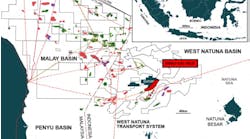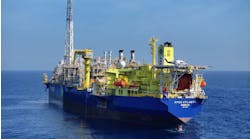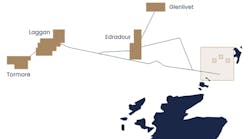Petrobras starts up fourth FPSO on Mero field offshore Brazil
Production has started through the FPSO Marechal Duque de Caxias, the third permanent platform on the Mero field in the presalt Santos Basin offshore Brazil.
The FPSO, chartered from MISC, can produce up to 180,000 bbl/d of oil and compress up to 12 MMcm/d of gas. It will raise installed oil throughput capacity at Mero from 410,000 bbl/d to 590,000 bbl/d.
Petrobras plans to connect eight subsea producer wells and seven water and gas injectors to the vessel. The FPSOs Guanabara (Mero 1) and Sepetiba (Mero 2) are the other permanent platforms, alongside the early production system FPSO Pioneiro de Libra.
From 2028, the Marechal Duque de Caxias should start using Petrobras’ HISEP technology, still under development, to separate at high-pressure produced oil from the gas at the seafloor, followed by reinjection of the CO2-rich gas into the reservoir. This will free space in the surface gas processing plant and limit greenhouse-gas emissions.
The FPSO is also equipped with water alternating gas reinjection technology, said MISC, and it is equipped to strip and re-inject CO2 from fuel gas production, with a capacity to compress up to 48 MMcf/d of CO2. In addition, there will be no routine flaring.
Predictive maintenance systems, designed to minimize operational downtime by anticipating equipment failures before they occur, should extend the life of machinery and lower maintenance costs, MISC added.
According to Petrobras’ partner TotalEnergies, a fourth permanent FPSO under construction named Mero-4, with a capacity of 180,000 bbl/d, should begin operating in 2025.
The production startup of Mero-3, which TotalEnergies announced yesterday, is less than a year after the startup of Mero-2, which TotalEnergies said is a new milestone for the company in Brazil.
Mero is a unitized field, operated by Petrobras (38.6%), in partnership with TotalEnergies (19.3%), Shell Brasil (19.3%), CNPC (9.65%), CNOOC (9.65%) and Pré-Sal Petróleo SA (3.5%) representing the government in the non-contracted area.



